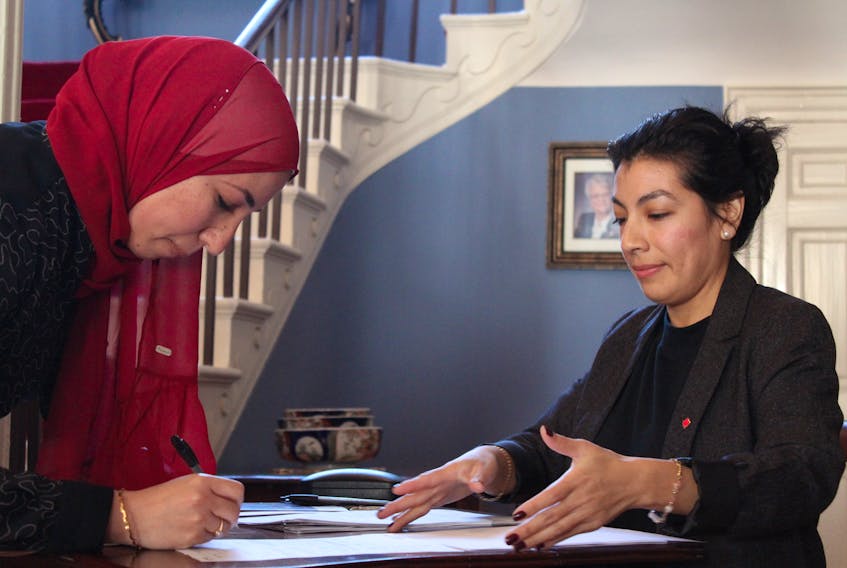CHARLOTTETOWN, P.E.I. — Immigration Canada says there are no backlogs in processing permanent residency, citizenship or other applications in the Atlantic provinces.
In a recent Guardian article, many newcomers to Canada voiced their concerns on the permanent residency application process and the seeming lack of support from Immigration Canada.
Béatrice Fénelon, a spokeswoman with Immigration, Refugees and Citizenship Canada (IRCC), says offices in Canada are open to clients and offer citizenship, immigration and settlement services, mostly by appointment.
“The IRCC has centralized processing centres in various locations across the country that specialize in processing specific programs and immigration streams from across Canada and around the world,” she said.
“These offices receive mailed-in applications, but they are not open to the public and do not offer assistance with the application process.”
The P.E.I. IRCC office re-opened last year and currently employs two intake officers who take in citizenship or permanent residency applications, making sure they are complete and putting them into the system.
But those officers do not process the applications themselves. Processing is done at the Case Processing Centre in Sydney, N.S.. There are currently 10 intake officers across the Atlantic provinces.
“We would (also) like to point out the process of the Atlantic Immigration Pilot,” said Fénelon.
“The pilot helps hire qualified candidates for jobs the employers have not been able to fill locally. These candidates can be overseas or living in Canada temporarily.”

The Atlantic Immigration Pilot (AIP) is a partnership between IRCC and the Atlantic provinces to test approaches on attracting and retaining skilled immigrants in Atlantic Canada.
The program was launched as a three-year pilot in 2017 to respond to “acute demographic and labour market challenges”, including slow economic growth, an aging workforce, and difficulty attracting and retaining immigrants.
“Increasing the retention rate of immigrants in the Atlantic region is one of the primary objectives of the Atlantic Immigration Pilot,” said Fénelon.
Another spokesperson with the IRCC said members do their best to make the immigration process as simple as possible, but because Immigration Canada processes applications, it can create a conflict-of-interest if IRCC is also giving immigration advice to clients.
Immigration Canada said it makes the deliberate decision not to give advice, but not because of a lack of resources.
For advice on the immigration process, the department said there are lawyers whose job it is to give advice on immigration, as well as consultants who are registered to give advice on the application process and what’s the best way of going from a temporary resident to a permanent resident or citizenship.
IRCC’s client support centre agents can help immigrants with general and case specific enquiries, but cannot make decisions on applications, they cannot help process applications faster (unless an immigrant meets the criteria for urgent processing) and cannot provide immigration advice.
The IRCC processing centre in Sydney, N.S., process applications regionally, which can take several months, but the IRCC said it has the streamlined the process as much as possible to make it easier for applicants.
Immigration Canada said they are hitting all of their economic categories and meeting their immigration targets.
Atlantic Immigration Pilot a huge boon for P.E.I., but can be complex for immigrants

Immigration in the Atlantic provinces has grown steadily since the implementation of the Atlantic Immigration Pilot since March of 2017.
The pilot received a two-year extension in March of last year and has seen changes that give international graduates more time to apply, flexibility for hiring health-care professionals and changes to the requirements for temporary work permit application.
The program was launched as a three-year pilot in 2017 to respond to “acute demographic and labour market challenges”, including slow economic growth, an aging workforce and difficulty attracting and retaining immigrants.
According the province of P.E.I., international immigration increased by 42.3 per cent from the second quarter in 2018 to the third quarter, and was up 24.8 per cent compared with the same period in 2018.
In addition to providing full-time employment, employers participating in the pilot are expected to support the needs of newcomer employees and their family members, including requiring all participants to obtain a settlement plan from a settlement service provider organization and supporting their employees in accessing the recommended services.
As far as how new immigrants can get support for their applications to citizenship or permanent residency, they have to go outside the federal agency to get it.
A spokesperson with Immigration Canada said immigration and citizenship representatives, such as citizenship or immigration consultants, lawyers, friends, family members or other third parties not affiliated with the government of Canada can explain and give advice on immigration or citizenship options.
These included helping immigrants choose the best immigration program, filling out and submitting immigration or citizenship applications, communicating with the federal government on an immigrant’s behalf and representing immigrants in an immigration or citizenship hearing.
However, Immigration Canada said it is important to note that only authorized representatives can charge for their services.
These representatives are lawyers and paralegals who are members in good standing of a Canadian provincial or territorial law society, notaries who are members in good standing of the Chambre des notaires du Québec and citizenship or immigration consultants who are members in good standing of the Immigration Consultants of Canada Regulatory Council.









